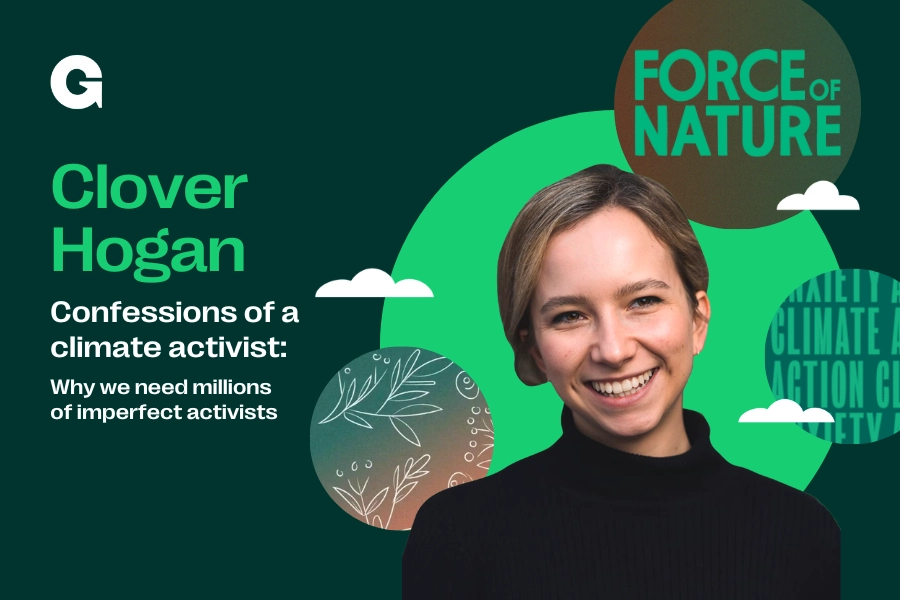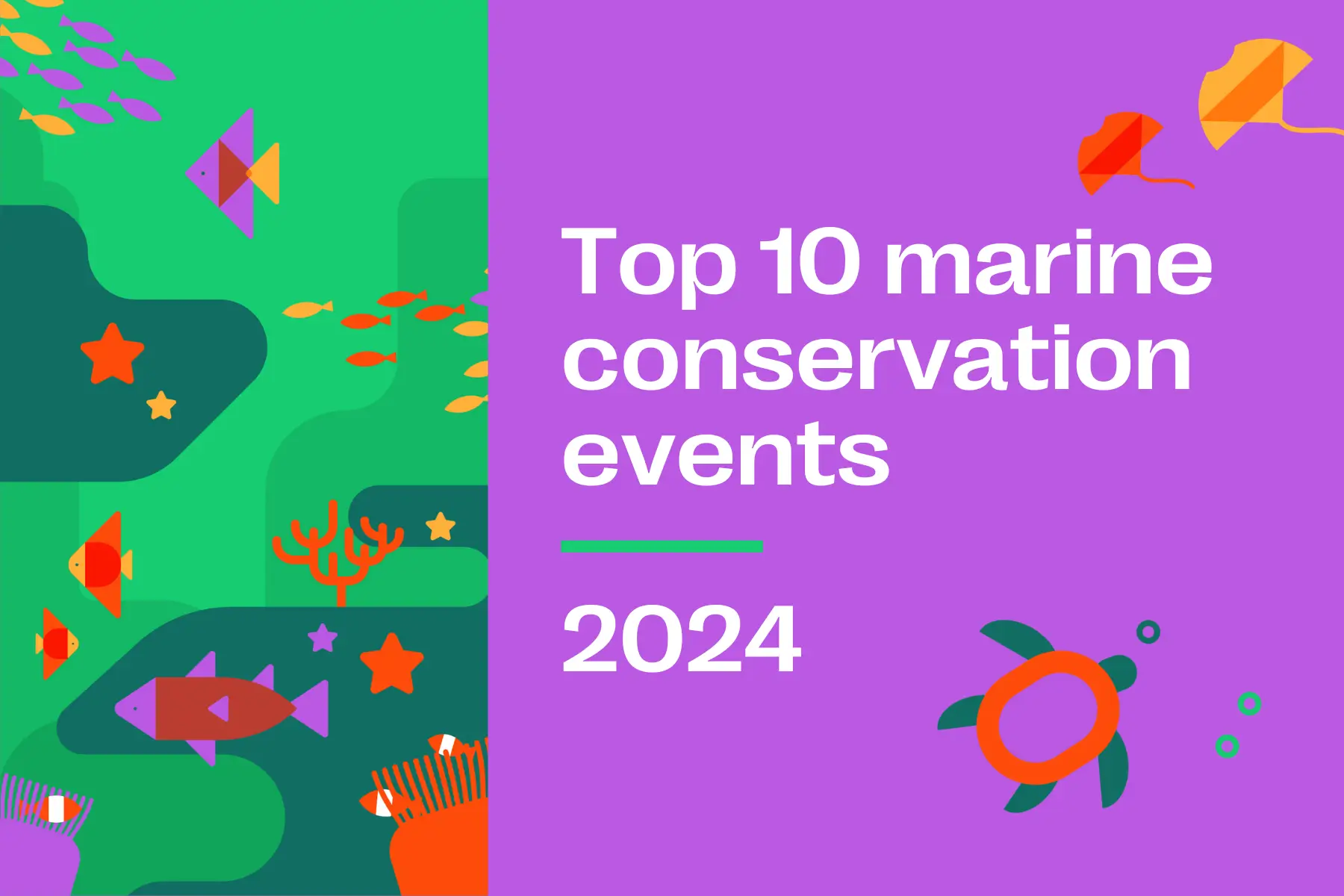A nature retreat with climate justice – and nightingales – at its heart
Sunita Ramani
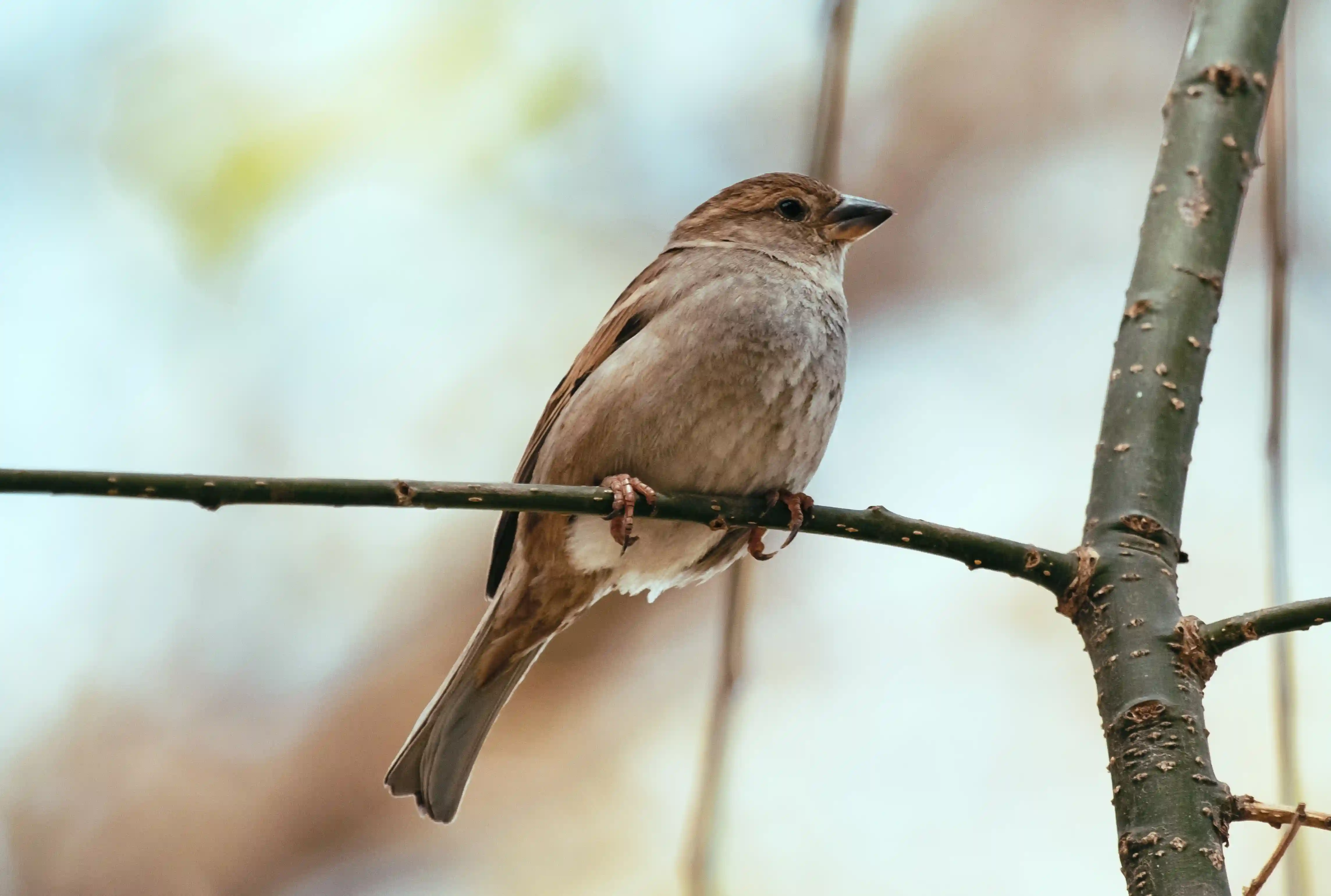
For many people in the UK, an evening deep in the countryside complete with hiking, camping and a roaring fire might not seem out of the ordinary. But for others this is a totally unknown experience – particularly for many communities from minority ethnic backgrounds who face significant barriers in accessing the outdoors and feeling welcome in these spaces.
Enter Climate Reframe: a community set up by and for people of colour who live and work in the environmental movement in the UK.
 But as the statistics show, people from our backgrounds aren’t used to spending time in the outdoors. We make up only 1% of visitors to National Parks, and areas largely made up of minority ethnic communities have 11 times less green space than areas where residents are predominantly white.
But two hours of chatting on the coach to Lewes relieved most of the anxiety, and on arrival, we were introduced to our wonderful guide Sam Lee. Lee founded The Nest Collective in 2005 as a small gathering of music and folk lovers and it has continued to grow ever since. Every springtime he hosts ‘Singing with Nightingales’, taking groups out into the woodlands after dark to experience the nightingale’s beautiful song. This was perhaps even more unique than usual, as it was the first time Sam was joined by a group made up entirely of people of colour in the climate movement.
But as the statistics show, people from our backgrounds aren’t used to spending time in the outdoors. We make up only 1% of visitors to National Parks, and areas largely made up of minority ethnic communities have 11 times less green space than areas where residents are predominantly white.
But two hours of chatting on the coach to Lewes relieved most of the anxiety, and on arrival, we were introduced to our wonderful guide Sam Lee. Lee founded The Nest Collective in 2005 as a small gathering of music and folk lovers and it has continued to grow ever since. Every springtime he hosts ‘Singing with Nightingales’, taking groups out into the woodlands after dark to experience the nightingale’s beautiful song. This was perhaps even more unique than usual, as it was the first time Sam was joined by a group made up entirely of people of colour in the climate movement.
 We began the evening with a hike into the woods, where the ground was carpeted with bluebells and tall, skinny trees rose up on all sides. Our hosts explained that this was a coppice woodland, referring to an ancient management technique that involves felling trees at their base so new shoots can grow, which improves the health and biodiversity of the area by opening it up to the sunlight and allowing a wider range of biodiversity to flourish.
As the evening chill crept in, we returned to a roaring campfire and steaming vats of rice and curry. Internationally recognised environmental lawyer and development policy expert Farhana Yamin, who coordinates the Climate Reframe network and co-organised the retreat, shared heartfelt words about our first community gathering and the resonant themes of migration.
A key part of the ‘Singing with Nightingales’ experience is that a different musician is invited along every evening, and we were joined at the fireside by Oud player Saied Silbak. Born in occupied Palestine, Silbak has performed in venues across the world, and he enchanted us with a series of traditional and self-composed Arabic folk songs which touched on themes of love, family and the natural world.
By midnight, darkness had fallen and we were ready to meet the nightingales. To help us connect even more deeply with nature, Lee wanted us to adapt our vision to the night, so we followed him into the woods without torches, relying only on the dim outline of the person ahead to guide us. We used a bird-like whistle to signal if any of us fell behind, and otherwise walked in silence to minimise our disturbance to the night creatures.
We began the evening with a hike into the woods, where the ground was carpeted with bluebells and tall, skinny trees rose up on all sides. Our hosts explained that this was a coppice woodland, referring to an ancient management technique that involves felling trees at their base so new shoots can grow, which improves the health and biodiversity of the area by opening it up to the sunlight and allowing a wider range of biodiversity to flourish.
As the evening chill crept in, we returned to a roaring campfire and steaming vats of rice and curry. Internationally recognised environmental lawyer and development policy expert Farhana Yamin, who coordinates the Climate Reframe network and co-organised the retreat, shared heartfelt words about our first community gathering and the resonant themes of migration.
A key part of the ‘Singing with Nightingales’ experience is that a different musician is invited along every evening, and we were joined at the fireside by Oud player Saied Silbak. Born in occupied Palestine, Silbak has performed in venues across the world, and he enchanted us with a series of traditional and self-composed Arabic folk songs which touched on themes of love, family and the natural world.
By midnight, darkness had fallen and we were ready to meet the nightingales. To help us connect even more deeply with nature, Lee wanted us to adapt our vision to the night, so we followed him into the woods without torches, relying only on the dim outline of the person ahead to guide us. We used a bird-like whistle to signal if any of us fell behind, and otherwise walked in silence to minimise our disturbance to the night creatures.
 After weeks of anticipation, hearing the first nightingale was breathtaking. The birds were unexpectedly loud, alternately chirping and delivering long whistling notes.
While they seemed hesitant at first, the moment Silbak plucked a few notes on the Oud, the nightingales burst into song. As we stood in a silent huddle, we were entertained by several minutes of a spontaneous duet between man and nightingale; Silbak would play a melody on the Oud, and the birds would follow him with a few bars of song, before pausing to wait for the next tune.
We could have stood and listened for hours, but we eventually made our way back to the campsite, some of the party heading back to London and the rest of us preparing to spend the night in tents, ‘glamping’ style.
The memory of the nightingales will stay with me for a long time. Unfortunately, these birds are increasingly under threat due to global warming and habitat loss, but it made me hopeful to think that each of the Climate Reframers are trying to address this in some way, by placing climate justice at the heart of our work.
I hope nightingales will continue to make their journey for many years to come and that all of us have the opportunity to hear their song, reminding us that transcending borders in all shapes and forms is a wonderful thing.
Did you enjoy this blog? You can find many more like this on the Greenhouse blog page.
You may also like:
- Join us in supporting Birdgirl’s Black2Nature fundraiser, making nature accessible to all
- Why land-rights justice for Indigenous Peoples and local communities must be at the heart of the climate movement
After weeks of anticipation, hearing the first nightingale was breathtaking. The birds were unexpectedly loud, alternately chirping and delivering long whistling notes.
While they seemed hesitant at first, the moment Silbak plucked a few notes on the Oud, the nightingales burst into song. As we stood in a silent huddle, we were entertained by several minutes of a spontaneous duet between man and nightingale; Silbak would play a melody on the Oud, and the birds would follow him with a few bars of song, before pausing to wait for the next tune.
We could have stood and listened for hours, but we eventually made our way back to the campsite, some of the party heading back to London and the rest of us preparing to spend the night in tents, ‘glamping’ style.
The memory of the nightingales will stay with me for a long time. Unfortunately, these birds are increasingly under threat due to global warming and habitat loss, but it made me hopeful to think that each of the Climate Reframers are trying to address this in some way, by placing climate justice at the heart of our work.
I hope nightingales will continue to make their journey for many years to come and that all of us have the opportunity to hear their song, reminding us that transcending borders in all shapes and forms is a wonderful thing.
Did you enjoy this blog? You can find many more like this on the Greenhouse blog page.
You may also like:
- Join us in supporting Birdgirl’s Black2Nature fundraiser, making nature accessible to all
- Why land-rights justice for Indigenous Peoples and local communities must be at the heart of the climate movement
A unique community for people of colour
When it first launched in 2019, the Climate Reframe network was made up of 100 climate activists, experts and advocates from racialised minority backgrounds. Its founders recognised not only that the climate movement was predominantly made up of white people, but that this lack of racial diversity and representation was impeding climate justice efforts. The non-profit Doc Society originally created the directory as a way to make it easier for the media and those looking to work with climate experts, as well as those within the climate space, to find people from diverse backgrounds. Members of the Climate Reframe community have already benefited from increased media exposure, as well as opportunities and support within the network. The network is continually expanding, and I was thrilled to be invited to join earlier this year – just months ahead of Climate Reframe’s first ever in-person gathering in nature.Connecting with the natural world
If you’re a bird enthusiast, you’ll know that nightingales arrive in the UK and Europe every spring, following an epic journey from Sub-Saharan Africa. As a group of people who are now in the UK as a result of our own or our ancestors’ migration across continents, it felt particularly poignant for us to gather to hear the nightingale’s song. One of the first things that struck me as we assembled by Kings Cross station was that while we were all excited to get out into nature together, many people felt nervous and unprepared.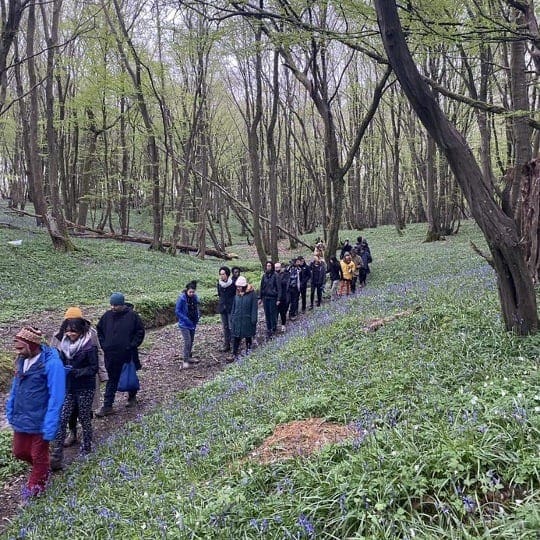 But as the statistics show, people from our backgrounds aren’t used to spending time in the outdoors. We make up only 1% of visitors to National Parks, and areas largely made up of minority ethnic communities have 11 times less green space than areas where residents are predominantly white.
But two hours of chatting on the coach to Lewes relieved most of the anxiety, and on arrival, we were introduced to our wonderful guide Sam Lee. Lee founded The Nest Collective in 2005 as a small gathering of music and folk lovers and it has continued to grow ever since. Every springtime he hosts ‘Singing with Nightingales’, taking groups out into the woodlands after dark to experience the nightingale’s beautiful song. This was perhaps even more unique than usual, as it was the first time Sam was joined by a group made up entirely of people of colour in the climate movement.
But as the statistics show, people from our backgrounds aren’t used to spending time in the outdoors. We make up only 1% of visitors to National Parks, and areas largely made up of minority ethnic communities have 11 times less green space than areas where residents are predominantly white.
But two hours of chatting on the coach to Lewes relieved most of the anxiety, and on arrival, we were introduced to our wonderful guide Sam Lee. Lee founded The Nest Collective in 2005 as a small gathering of music and folk lovers and it has continued to grow ever since. Every springtime he hosts ‘Singing with Nightingales’, taking groups out into the woodlands after dark to experience the nightingale’s beautiful song. This was perhaps even more unique than usual, as it was the first time Sam was joined by a group made up entirely of people of colour in the climate movement.
Meeting the nightingales
 We began the evening with a hike into the woods, where the ground was carpeted with bluebells and tall, skinny trees rose up on all sides. Our hosts explained that this was a coppice woodland, referring to an ancient management technique that involves felling trees at their base so new shoots can grow, which improves the health and biodiversity of the area by opening it up to the sunlight and allowing a wider range of biodiversity to flourish.
As the evening chill crept in, we returned to a roaring campfire and steaming vats of rice and curry. Internationally recognised environmental lawyer and development policy expert Farhana Yamin, who coordinates the Climate Reframe network and co-organised the retreat, shared heartfelt words about our first community gathering and the resonant themes of migration.
A key part of the ‘Singing with Nightingales’ experience is that a different musician is invited along every evening, and we were joined at the fireside by Oud player Saied Silbak. Born in occupied Palestine, Silbak has performed in venues across the world, and he enchanted us with a series of traditional and self-composed Arabic folk songs which touched on themes of love, family and the natural world.
By midnight, darkness had fallen and we were ready to meet the nightingales. To help us connect even more deeply with nature, Lee wanted us to adapt our vision to the night, so we followed him into the woods without torches, relying only on the dim outline of the person ahead to guide us. We used a bird-like whistle to signal if any of us fell behind, and otherwise walked in silence to minimise our disturbance to the night creatures.
We began the evening with a hike into the woods, where the ground was carpeted with bluebells and tall, skinny trees rose up on all sides. Our hosts explained that this was a coppice woodland, referring to an ancient management technique that involves felling trees at their base so new shoots can grow, which improves the health and biodiversity of the area by opening it up to the sunlight and allowing a wider range of biodiversity to flourish.
As the evening chill crept in, we returned to a roaring campfire and steaming vats of rice and curry. Internationally recognised environmental lawyer and development policy expert Farhana Yamin, who coordinates the Climate Reframe network and co-organised the retreat, shared heartfelt words about our first community gathering and the resonant themes of migration.
A key part of the ‘Singing with Nightingales’ experience is that a different musician is invited along every evening, and we were joined at the fireside by Oud player Saied Silbak. Born in occupied Palestine, Silbak has performed in venues across the world, and he enchanted us with a series of traditional and self-composed Arabic folk songs which touched on themes of love, family and the natural world.
By midnight, darkness had fallen and we were ready to meet the nightingales. To help us connect even more deeply with nature, Lee wanted us to adapt our vision to the night, so we followed him into the woods without torches, relying only on the dim outline of the person ahead to guide us. We used a bird-like whistle to signal if any of us fell behind, and otherwise walked in silence to minimise our disturbance to the night creatures.
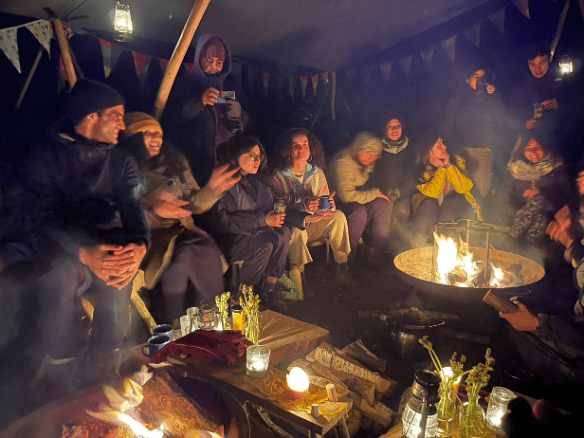 After weeks of anticipation, hearing the first nightingale was breathtaking. The birds were unexpectedly loud, alternately chirping and delivering long whistling notes.
While they seemed hesitant at first, the moment Silbak plucked a few notes on the Oud, the nightingales burst into song. As we stood in a silent huddle, we were entertained by several minutes of a spontaneous duet between man and nightingale; Silbak would play a melody on the Oud, and the birds would follow him with a few bars of song, before pausing to wait for the next tune.
We could have stood and listened for hours, but we eventually made our way back to the campsite, some of the party heading back to London and the rest of us preparing to spend the night in tents, ‘glamping’ style.
The memory of the nightingales will stay with me for a long time. Unfortunately, these birds are increasingly under threat due to global warming and habitat loss, but it made me hopeful to think that each of the Climate Reframers are trying to address this in some way, by placing climate justice at the heart of our work.
I hope nightingales will continue to make their journey for many years to come and that all of us have the opportunity to hear their song, reminding us that transcending borders in all shapes and forms is a wonderful thing.
Did you enjoy this blog? You can find many more like this on the Greenhouse blog page.
You may also like:
- Join us in supporting Birdgirl’s Black2Nature fundraiser, making nature accessible to all
- Why land-rights justice for Indigenous Peoples and local communities must be at the heart of the climate movement
After weeks of anticipation, hearing the first nightingale was breathtaking. The birds were unexpectedly loud, alternately chirping and delivering long whistling notes.
While they seemed hesitant at first, the moment Silbak plucked a few notes on the Oud, the nightingales burst into song. As we stood in a silent huddle, we were entertained by several minutes of a spontaneous duet between man and nightingale; Silbak would play a melody on the Oud, and the birds would follow him with a few bars of song, before pausing to wait for the next tune.
We could have stood and listened for hours, but we eventually made our way back to the campsite, some of the party heading back to London and the rest of us preparing to spend the night in tents, ‘glamping’ style.
The memory of the nightingales will stay with me for a long time. Unfortunately, these birds are increasingly under threat due to global warming and habitat loss, but it made me hopeful to think that each of the Climate Reframers are trying to address this in some way, by placing climate justice at the heart of our work.
I hope nightingales will continue to make their journey for many years to come and that all of us have the opportunity to hear their song, reminding us that transcending borders in all shapes and forms is a wonderful thing.
Did you enjoy this blog? You can find many more like this on the Greenhouse blog page.
You may also like:
- Join us in supporting Birdgirl’s Black2Nature fundraiser, making nature accessible to all
- Why land-rights justice for Indigenous Peoples and local communities must be at the heart of the climate movement 